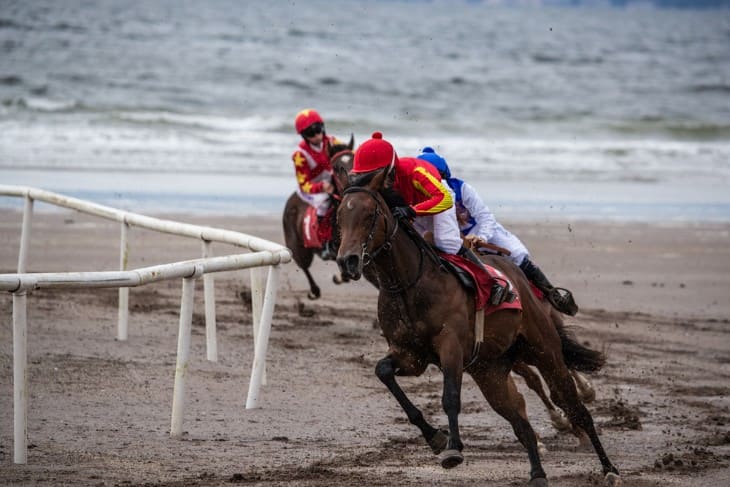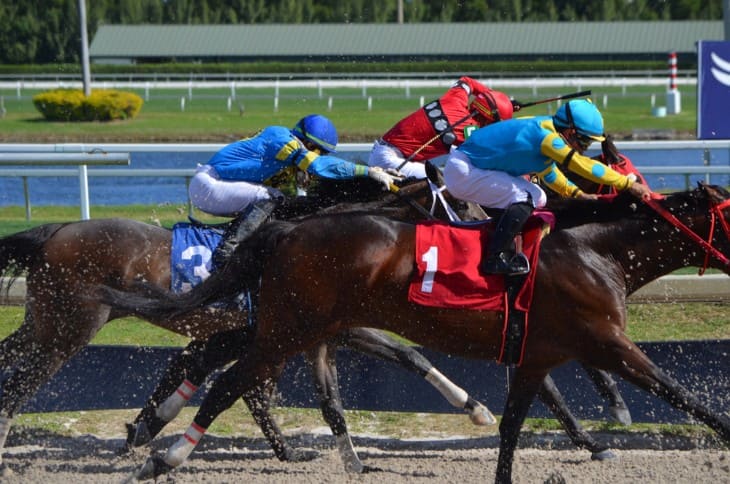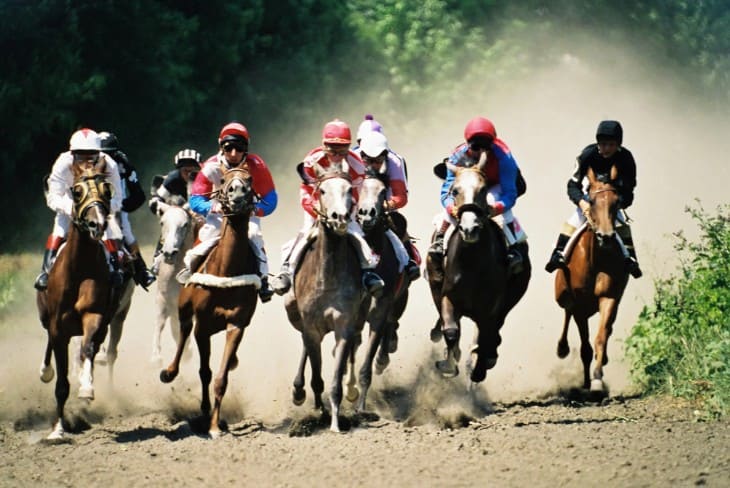- The Art of Understanding Form: Decoding Horse Racing Performance
- Delving into Data: Unveiling Advanced Statistical Analysis for Betting
- Handicapping Hints: Evaluating Weight and Class in Horse Racing
- Elevating Your Game: Sophisticated Strategies for Seasoned Players
- Unravelling the Track Conditions: How Weather Affects Betting Choices
- Getting an Edge Through Early and Inside Information
- Mastering Betting Exchanges: Enhancing Your Wagering Opportunities
- Beyond Win Bets: Maximising Gains with Each-Way Betting
- Exotic Wagers Unleashed: Exploring Trifectas, Exactas, and Superfectas
- Money Management Techniques: Optimal Staking for Long-Term Success
- Reading the Odds: Identifying Value Bets Like a Pro
- Conclusion
The Art of Understanding Form: Decoding Horse Racing Performance
Understanding a horse's recent racing history or "form" is critical for successful betting. By analysing past runs over factors like race distance, track conditions, competition faced, and consistency of finishes, you gain insight into a horse's abilities.
Scrutinise finishing positions across a horse's last few starts. Look for horses able to demonstrate top tier performances, especially against runners of similar ability. The most reliable horses will exhibit consistency across varying circumstances.
Also consider things like trainer and jockey performance when assessing form. Their skill and decision making can significantly impact the outcome. Identify positive jockey/trainer combinations that regularly get the best from their mounts.
- Carefully compare form at the specific race distance to identify horses proven over the trip or with scope to improve stepped up or down.
- Changes in performance on different track surfaces can highlight preferences and disliking for ground conditions.
- Drops down in grade can allow classy horses to dominate, while consistent improvers stepping up warrant respect.
Delving into Data: Unveiling Advanced Statistical Analysis for Betting
Detailed past performance data and speed figures allow bettors to uncover trends influential to a horse’s chances. Machine learning algorithms can also process volumes of historical info to provide race predictions.
"Pace" and "speed" figures rate performances while accounting for variables like competition and track condition. This enables standardised comparisons of horse ability across differing situations. Identify runners able to record figures that give them an edge.
Consider using algorithms to supplement your own analysis. These programs can rapidly identify patterns in huge data sets that even the sharpest human eye would likely miss. Their recommendations provide a data driven perspective on each runner's probability of success.
- Variance in performance dependent on field size can highlight horses that excel with less crowding and pressure.
- Analyse ability to carry weight scales imposed by handicappers, which can give hardy horses an advantage when well-handicapped.
- Changes in jockey bookings can signify connections anticipation of an improved or deteriorated performance.

Handicapping Hints: Evaluating Weight and Class in Horse Racing
Handicapping involves judging both the weight imposed on a horse relative to its ability to carry it, and the calibre of rivalry competed against recently. This provides insight on whether a horse appears well-treated under race conditions.
Weight allotments are made by officials to equalise contests between runners of differing ability. However, some horses handle these imposts better and can still perform while conceding weight to rivals. Identify these tough and hardy handicap specialists.
Additionally, contrast recent competition grades to determine whether a horse appears matched in class or potentially overfaced or under challenged. Horses dropping down in class often improve, while those stepped up in trips or conditions can struggle.
- Handicap debut runs for previously untested horses warrant respect, as official handicappers will have limited data to work with in assigning weight.
- Maidens and first time starters carrying above average imposts could signify promising gallops prompting connections expectations.
- Identifying excusable poor runs, like troubled trips or rider mistakes, allows forgiveness of blips in form that could overlay a horse’s odds.
Elevating Your Game: Sophisticated Strategies for Seasoned Players
For serious punters who have already grasped the fundamentals, plenty of opportunities exist to take your betting prowess to the next level with more advanced techniques. Understanding key concepts like assessing form, capitalising on betting exchange dynamics, and strategically utilising each-way betting can significantly sharpen your edge.
The ability to accurately rate the quality of a horse's recent runs, commonly referred to as its "form", is arguably the most critical skill. Comparing finishing positions and times between starts reveals insights on consistency and race fitness. Additionally, factoring in variables like field size, track condition, trip, and weight carried enables proper context when judging performance.
Betting exchanges open up possibilities for experienced players through features like in-play wagering. Capitalising on live odds movements by trading positions as the probability of outcomes changes mid-race allows nimble punters to secure profits regardless. Practised players can also exploit pricing discrepancies between bookies across international exchanges.
Meanwhile, converting win wagers into each-way bets can provide protection on upside. The insurance of a place payout limits downside risk on long odds selections. Savvy players selectively pick spots where fields offer higher than average place terms or bad favourite odds boost exotic payouts.
By continuing to build on advanced skills like these that require practise beyond novice betting, experienced punters separate themselves from the casual crowd and unlock greater profitability potential.
Unravelling the Track Conditions: How Weather Affects Betting Choices
Weather and resulting track conditions have a huge influence on performance, so an awareness of forecasted conditions and horse preferences is key.
While track ratings provide a standardised gauge of moisture content, individual horse affinity for differing ground varies. Certain runners handle easing conditions and retain ability despite a cut in the surface. This can make them dangerous on days when rain is forecast.
Extreme heat or cold also impacts proceedings, with fitness, hydration and the ability to cope with demands all challenged under atypical weather patterns for the season. Consider whether horses have proven themselves in adverse conditions.
- Changes in going from turf to synthetic or dirt surfaces switches the dynamic, bringing specialty dirt or turf performers into contention.
- Races over hurdles or steeplechase courses bring stamina and jumping proficiency into prominence as critical factors.
- Altitude and air density should be considered for races in locations substantially above sea level.
Getting an Edge Through Early and Inside Information
In horse racing, information is everything when gaining an advantage over recreational bettors. Experienced players enhance profits by uncovering and capitalising on key details surrounding a horse's preparation and connections' plans or expectations.
Monitoring early betting moves, whispers, and stable gossip can provide an information edge. Big money starting to back a horse whose odds then collapse frequently indicates inside knowledge on its readiness to run a career best. This "market intelligence" should prompt your own investigations.
Additionally, developing relationships with trainers, jockeys, owners or other industry insiders can yield subtle clues worth factoring into your own assessments on chances. Piece these together with your own observations from gallops and evidence comes in at many levels.
Of course, the power of information spreads quickly across betting circles nowadays. But by staying plugged in and proactively seeking that marginal edge wherever it exists, advantages still present themselves to those working hardest and smartest to leverage them for profit.
Mastering Betting Exchanges: Enhancing Your Wagering Opportunities
Betting exchanges facilitate peer-to-peer wagering rather than betting against a bookmaker. This allows punters to not just back horses to win, but also lay them to lose.
The ability to take a bookmaking position against runners opens up many new strategic possibilities. Laying fancied runners aims to secure a profit if they get beat. But substantial liability occurs if they win, so caution must be exercised.
Another key feature of exchanges is in-play betting, which allows punters to react to events as they occur by trading positions on horses as odds fluctuate during the race. This opens up many additional betting angles to be exploited.
- Dutch betting techniques backing/laying multiple runners provide additional options to lock in profits regardless of the outcome.
- Hedging by backing and laying the same runner also enables liability management to protect capital and secure wins.
- Software tools performing complex lay bets across multiple exchanges give access to greater liquidity and optimal odds.
Beyond Win Bets: Maximising Gains with Each-Way Betting
Each-way betting combines a win and place bet, providing two chances to profit. If your selection wins - both bets pay out. If it places without winning - the place bet returns a fraction of the odds.
Each-way bets provide security in case your pick falls short of winning but still makes the frame. They offer enhanced value in larger field contests where the likelihood of grabbing a place finish improves.
The exact place terms offered differs between races based on field size and type of race. Be aware of these specifics when determining if a horse's odds offer value when betting it each-way.
- In handicap races each-way betting adds appeal, with the weight allowances meaning more horses are closely matched on ability.
- When backing longshots, the insurance of a place payout can allow betting on higher odds, with greater win risk tolerable.
- Comparing odds in win only and each-way markets identifies cases when E/W overrounds look favourable.
Exotic Wagers Unleashed: Exploring Trifectas, Exactas, and Superfectas
Exotic wagers require correctly predicting multiple finishers in exact order. While difficult to hit, the payout potential is enormous.
Trifectas require picking the 1st, 2nd and 3rd horses across the line. A combination trifecta "boxing" multiple selections expands chances to hit these bets but also increases cost.
For even greater risk but higher rewards, exactas task the bettor with getting both the win and place horse in correct sequence. And the superfecta takes it to another level by demanding the top four finishers in order.
- Keying exotic bets narrows coverage down to a single pick in one position, allowing wider permutations around it at lower cost.
- Playing wheels structures combinations around a single horse finishing 1st alongside all other runners finishing 2nd/3rd.
- Minimum pool guarantees offered by some tracks provide insurance exotic pools will reach lucrative thresholds.

Money Management Techniques: Optimal Staking for Long-Term Success
A betting bankroll should be money you can afford to set aside. Betting a small percentage of it each wager controls exposure and smooths the ride through up and down periods.
Avoid emotional reaction to results by sticking to a staking plan even during losing runs. Chasing losses leads to unsustainable spiralling stake sizes and the risk of ruin. Stay disciplined.
Keeping records of wagers and results enables performance tracking to identify failings and encourage critical self-review. Finding leaks in your process improves future decision making.
- Consider partial rather than full Kelly staking strategies to reduce volatility and protect bankrolls during inevitable periods of misfiring.
- Bankroll split between different bet types controls exposure to each pool and avoids aggregation wiping out funds in correlated failures.
- Loss trigger and stop loss rules protect bankrolls by capping downside variability when on a cold streak.
Reading the Odds: Identifying Value Bets Like a Pro
Odds provide insights on the bookmaker's assessment of a horse's chances, allowing comparison to your own to uncover overlays.
Converting odds into percentages provides a metric to quantify expected wins. If you deem a horse has a better percentage chance than the odds imply, a value opportunity exists to capitalise upon.
Monitoring movements in the betting markets leads to clues on where "wiseguy" money targeting perceived overlays is being placed, and allows you to similarly position yourself.
- Comparing best odds rather than taking bookmaker prices exploits minor differences between bookies to incrementally maximise returns.
- Analysing historical odds-to-probability charts identifies tendencies for certain odds ranges to underestimate vs overestimate actual strike rates.
- Major market plunges typically signify inside information on a horse's chances - the stable's own money going on expects a big run.
Conclusion
Successfully betting on horse racing as an endeavour based on skill rather than luck, requires expertise across a variety of handicapping factors. Understanding key concepts of form, class, statistics, money management and odds analysis separates winning punters from losing ones. Continuously developing your skills in these areas helps ensure you maintain an edge.








